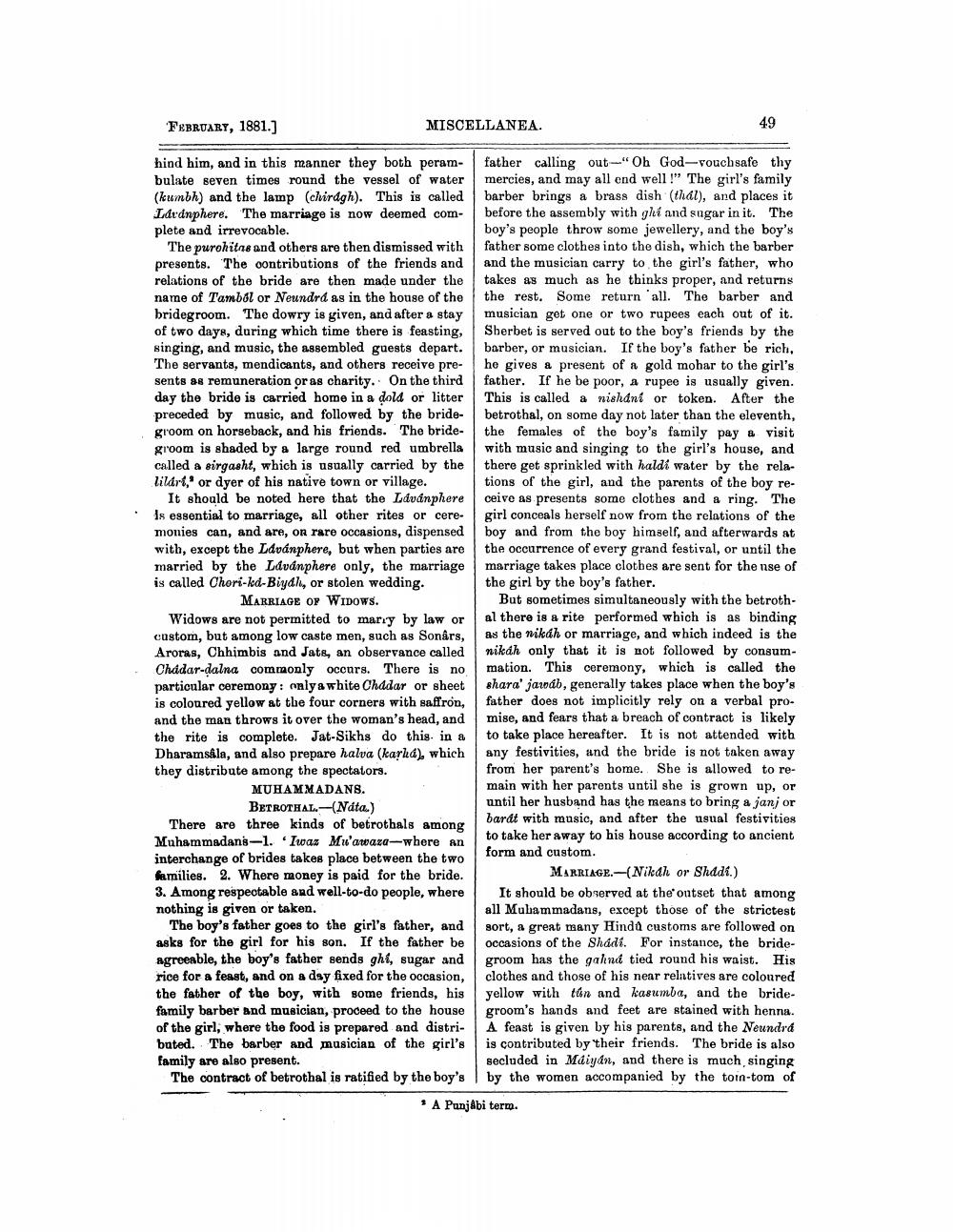________________
MISCELLANEA.
FEBRUARY, 1881.]
hind him, and in this manner they both perambulate seven times round the vessel of water (kumbh) and the lamp (chirdgh). This is called Lávánphere. The marriage is now deemed complete and irrevocable.
The purohitas and others are then dismissed with presents. The contributions of the friends and relations of the bride are then made under the name of Tamból or Neundrá as in the house of the bridegroom. The dowry is given, and after a stay of two days, during which time there is feasting, singing, and music, the assembled guests depart. The servants, mendicants, and others receive presents as remuneration or as charity. On the third day the bride is carried home in a dold or litter preceded by music, and followed by the bridegroom on horseback, and his friends. The bridegroom is shaded by a large round red umbrella called a sirgasht, which is usually carried by the lilárt, or dyer of his native town or village.
It should be noted here that the Lávánphere is essential to marriage, all other rites or ceremonies can, and are, on rare occasions, dispensed with, except the Lávánphere, but when parties are married by the Lávánphere only, the marriage is called Chori-kd-Biyah, or stolen wedding. MARRIAGE OF WIDOWS.
Widows are not permitted to marry by law or custom, but among low caste men, such as Sonârs, Aroras, Chhimbis and Jats, an observance called Chadar-dalna commonly occurs. There is no particular ceremony: only a white Chadar or sheet is coloured yellow at the four corners with saffron, and the man throws it over the woman's head, and the rite is complete. Jat-Sikhs do this in a Dharamsala, and also prepare halva (karka), which they distribute among the spectators.
MUHAMMADANS.
BETROTHAL (Náta.)
There are three kinds of betrothals among Muhammadans-1. Iwaz Mu'awaza-where an interchange of brides takes place between the two families. 2. Where money is paid for the bride. 3. Among respectable and well-to-do people, where nothing is given or taken.
The boy's father goes to the girl's father, and asks for the girl for his son. If the father be agreeable, the boy's father sends ghi, sugar and rice for a feast, and on a day fixed for the occasion, the father of the boy, with some friends, his family barber and musician, proceed to the house of the girl, where the food is prepared and distributed. The barber and musician of the girl's family are also present.
The contract of betrothal is ratified by the boy's
49
father calling out-"Oh God-vouchsafe thy mercies, and may all end well!" The girl's family barber brings a brass dish (thal), and places it before the assembly with ghi and sugar in it. The boy's people throw some jewellery, and the boy's father some clothes into the dish, which the barber and the musician carry to the girl's father, who takes as much as he thinks proper, and returns the rest. Some return all. The barber and musician get one or two rupees each out of it. Sherbet is served out to the boy's friends by the barber, or musician. If the boy's father be rich, he gives a present of a gold mohar to the girl's father. If he be poor, a rupee is usually given. This is called a nishani or token. After the betrothal, on some day not later than the eleventh, the females of the boy's family pay a visit with music and singing to the girl's house, and there get sprinkled with haldi water by the relations of the girl, and the parents of the boy receive as presents some clothes and a ring. The girl conceals herself now from the relations of the boy and from the boy himself, and afterwards at the occurrence of every grand festival, or until the marriage takes place clothes are sent for the use of the girl by the boy's father.
But sometimes simultaneously with the betrothal there is a rite performed which is as binding as the nikah or marriage, and which indeed is the nikáh only that it is not followed by consummation. This ceremony, which is called the shara' jawab, generally takes place when the boy's father does not implicitly rely on a verbal promise, and fears that a breach of contract is likely to take place hereafter. It is not attended with any festivities, and the bride is not taken away from her parent's home. She is allowed to remain with her parents until she is grown up, or until her husband has the means to bring a janj or bardt with music, and after the usual festivities to take her away to his house according to ancient form and custom.
MARRIAGE. (Nikah or Shadi.)
It should be observed at the outset that among all Muhammadans, except those of the strictest sort, a great many Hinda customs are followed on occasions of the Shadi. For instance, the bridegroom has the gahnd tied round his waist. His clothes and those of his near relatives are coloured yellow with tan and kasumba, and the bridegroom's hands and feet are stained with henna. A feast is given by his parents, and the Neundrá is contributed by their friends. The bride is also secluded in Máiyán, and there is much, singing by the women accompanied by the toin-tom of
* A Punjabi term.




